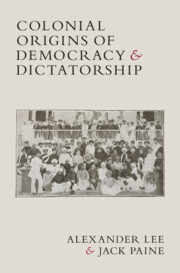Book contents
- Frontmatter
- Contents
- Figures
- Tables
- Acknowledgments
- 1 Introduction
- 2 A Theory of Colonial Electoral Institutions
- 3 Representation in Settler Colonies through 1850
- 4 Imperial Expansion and Restrictive Elections: 1850–1945
- 5 Mass Franchise Expansion after 1945
- 6 Postcolonial Persistence
- 7 Conclusion
- Appendix: Data and Regression Analysis
- References
- Index
1 - Introduction
Published online by Cambridge University Press: 08 May 2024
- Frontmatter
- Contents
- Figures
- Tables
- Acknowledgments
- 1 Introduction
- 2 A Theory of Colonial Electoral Institutions
- 3 Representation in Settler Colonies through 1850
- 4 Imperial Expansion and Restrictive Elections: 1850–1945
- 5 Mass Franchise Expansion after 1945
- 6 Postcolonial Persistence
- 7 Conclusion
- Appendix: Data and Regression Analysis
- References
- Index
Summary
Why are some countries more democratic than others? For most non-European countries, elections began under Western colonial rule. However, existing research largely overlooks these democratic origins. This book analyzes a global sample of colonies across four centuries to explain the emergence of colonial electoral institutions and their lasting impact. The degree of democracy in the metropole, the size of the white settler population, and pressure from non-Europeans shaped the timing and form of colonial elections. White settlers and non-white middle classes educated in the colonizer’s language usually gained early elections, but settler minorities resisted subsequent franchise expansion. Authoritarian metropoles blocked elections entirely. Countries with lengthy exposure to competitive colonial institutions tended to consolidate democracies after independence. By contrast, countries with shorter electoral episodes usually shed democratic institutions, and countries that were denied colonial elections consolidated stable dictatorships. Regime trajectories shaped by colonial rule persist to the present day.
Keywords
- Type
- Chapter
- Information
- Colonial Origins of Democracy and Dictatorship , pp. 1 - 24Publisher: Cambridge University PressPrint publication year: 2024

